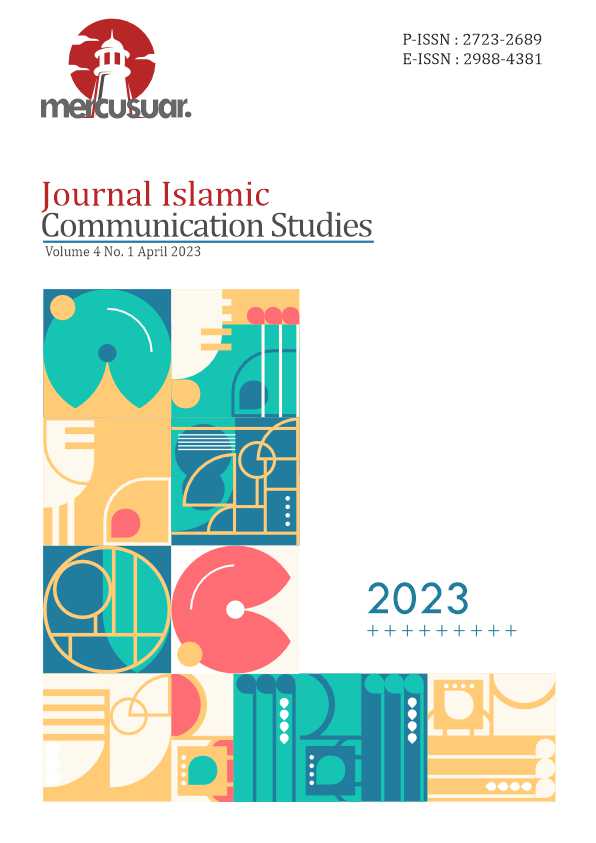Mepokoaso in the Tolaki Tribe as a Da'wah Medium in Preventing Interreligious Conflicts in South Konawe
Abstract
This research focuses on the cultural values of Mepokoaso in the Tolaki tribe as a medium for religious outreach to prevent interfaith conflicts in South Konawe. The study aims to examine the implementation of Mepokoaso's cultural values within the Tolaki tribe as a means of religious outreach to prevent interfaith conflicts in South Konawe.
This research employs the Cultural Da'wah approach, while the research type used is qualitative descriptive, situated in Amoito Jaya Village, Wolasi Subdistrict, South Konawe Regency. Data sources include the Tolaki Tribe's Customary Institution, Religious Counselors, Pastors, and Islamic and Christian Community Leaders. The data collection methods used in this research are observation, interviews, and documentation. The research instrument is the researcher themselves. Data processing and analysis are conducted through three stages: data reduction, data presentation, and drawing conclusions.
The results of this research show that Mepokoaso in the Tolaki Tribe is a culture embedded in Kalosara, namely Sara Medulu Ronga Mepokoaso (fundamental customs in family relations and general unity). The relationship between Islam and Christianity in Amoito Jaya Village, Wolasi Subdistrict, has not experienced conflicts, but there are potential seeds of conflict such as interfaith marriages, polarization, and religious fanaticism. Additionally, three supporting factors contribute to interfaith harmony: the transmission of deeply rooted ancestral values, healthy social interactions, and the fact that the followers of Islam and Christianity are part of the same family.
There are four values inherent in the Mepokoaso culture in the Tolaki tribe: justice, kindness, consistency, and balance. These values are actualized through attitudes such as Samaturu ronga Meohai (mutual cooperation and brotherhood), Metealo-alo (mutual assistance), Budaya Kalosara, and Tarian Lulo. Other attitudes include Mombekapona pona ako (mutual respect), mombeka peha-pehawa ako (mutual reminders), and ronga mombeka pei peiranga ako (mutual suggestions and advice).
The implications of this research are that, after investigating Mepokoaso in the Tolaki tribe as a medium for religious outreach to prevent interfaith conflicts in South Konawe, it is expected to provide new material and instruments for contemporary religious propagation. Once the community sees and understands the values contained within the Mepokoaso culture, it is hoped that they will incorporate these values into their daily lives to foster brotherhood, unity, and harmony among different faith communities. Additionally, it is hoped that the Tolaki community in South Konawe will be able to apply the cultural values of Mepokoaso in their societal life
Downloads
References
Nasir and Rahmawati. M, “Dentifikasi Nilai Pedagogis Tarian Lulo Untuk Integrasi Bangsa (Study Ethnography Masyarakat Di Sulawesi Tenggara),” Titian: Jurnal Ilmu Humaniora 03, no. 02 (2019)
Basrin Melamba, “Interaksi Islam Degan Budaya Barasandi Dan Aktifitas Sosial Keagamaan Orang Tolaki Di Sulawesi Tenggara,” El-HARAKAH 14, no. 2 (2012)
Basrin Melamba, TOLAKI: Sejarah, Identitas, Dan Kebudayaan, 1st ed. (Yogyakarta: Lukita, 2013)
Nurjan Asliah and Dkk Zainal Wamuna, “Pararelisme Keyakinan: Relasi Kesalahpahaman Antar Iman Pada Masyarakat Tolaki Lambuya,” Istiqro 10, no. 02 (2011)
Kementerian Agama RI, Alquran Dan Terjemahnya (Jakarta: Kementerian Agama RI, 2019).
Alifuddin, “Dakwah Inklusif Dalam Masyarakat Segregatif Di Aoma Dan Ambesakoa Sulawesi Tenggara,”
Afiyatur Royanah, “Pesan Dakwah Tentang Toleransi Antar Umat Beragama Dalam Buku Kumpulan Kisah ‘ Laki -Laki Yang Tak Berhenti Menangis ’ Karya Rusdi Mathari” (UIN Walisongo Semarang, 2021)


